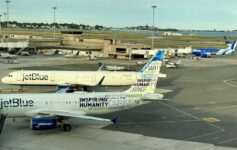A recent ruling to block JetBlue’s acquisition of Spirit Airlines could have broad implications for not only both carriers but the US airline market.
If you are considering booking travel or signing up for a new credit card please click here. Both support LiveAndLetsFly.com.
If you haven’t followed us on Facebook or Instagram, add us today.
With a federal judge ruling in the case against JetBlue and Spirit who had planned to combine forces, it’s created many more questions about the future of both carriers apart, and together, of new bed fellows, and of the Alaska-Hawaii deal too.
Will They, Won’t They?
The proposed merger of JetBlue Airways and Spirit Airlines valued at $3.8 billion would have created the fifth largest airline in the world’s largest market for air travel. The Justice Department and 10 state attorney generals brought the suit against JetBlue.
Immediately, JetBlue and Spirit didn’t officially comment on challenging the ruling. In the days that followed Spirit had back purportedly indicated that they felt the agreement with JetBlue required the New York-based carrier to fight to the extent that it could to complete the deal. The two announced on Friday that they would appeal the decision but that was only after Spirit provided guidance to investors that it would report earnings at the upper limits of its Q4 guidance. And that, of course was after Spirit’s stock dropped following news of the court’s decision and a hasty comment that one analyst would assume a bankruptcy is forthcoming.
It’s possible that in court and outside of it, Spirit might have made itself look as though it needed the deal to survive. But then, once the deal was struck down and JetBlue seemed less enthusiastic to keep fighting, Spirit was quick to announce the ways in which it was succeeding. It’s also possible that the market and talking heads were quick to bury a business that had already made changes (selling off planes, offering voluntary exit packages) in the preceding months when failure was unfounded.
It’s interesting now that the deal won’t happen and JetBlue won’t be filling every route with Mint seats and the most space in coach, that many have stated that the market needs Spirit to keep airlines honest. AFAR compared New York to Florida flights on routes where Spirit didn’t fly (or at least not every day.)
“This is what the Justice Department lawyers called the “Spirit Effect,” in which “Spirit’s presence in a market forces other air carriers, including JetBlue, to lower their fares.”
You can see an example of the “Spirit Effect” on JetBlue’s airfares for flights between New York’s La Guardia Airport (LGA) and Florida. One-way JetBlue fares this March from LGA to Fort Lauderdale (where Spirit has regular flights) are about $119 on average, according to JetBlue’s website. However, JetBlue’s flights from LGA to Jacksonville, Florida, where Spirit does not fly, cost an average of about $194 this March, a 63 percent price premium for a shorter flight.” – AFAR
Yet, these same reluctant supporters of at least Spirit as a market concept, bemoan the democratization and as Matthew points out. They ignore that the cheapest fares at competing network carriers also charge for all of the same things that Spirit does including seat assignment, carry-ons (some), checked bags, and so on.
It’s that Spirit effect that the judge attempted to preserve and the fact that a unique market player with 50% of the ULCC market would be removed and replaced by something presumptively more expensive and not a ULCC at all. This is important for a few reasons.
Marry Within Your Station
The judge’s ruling would suggest that if the two were like carriers in the same market strata, the government wouldn’t have had a leg to stand on. Creating a larger ULCC wouldn’t have removed a choice for consumers and moved prices upward – on this, the judge and I agree. Presumably, a Frontier, Allegiant, Avelo, or Breeze tie-up would have been approved according to this logic.
Yet when Southwest acquired AirTran Airways in 2010, an argument could have been made that Southwest at the time was an LCC and AirTran Airways was a ULCC, would this have been approved? At the current market position of Southwest, often pricing fares higher than competitors, it would undoubtedly be denied today.
We may find the answer with Alaska Airlines’ proposed purchase of Hawaiian Airlines. Hawaiian isn’t particularly ULCC nor LCC and Alaska is absolutely a network carrier and newly a member of the oneworld alliance. From a market strata perspective, the two are likely viewed the same with neither putting particularly strong downward or upward pressure on fares to the islands. However, they would leapfrog United for seats to the islands:
“The latest OAG data shows that Hawaiian and Alaska are the second- and third-largest providers of Hawaii-U.S. mainland capacity at present, behind United Airlines in first position. United has a 23.5% capacity share in December 2023, with Hawaiian on 23.2% and Alaska on 16.9%.
Based on current schedules—and ignoring any potential merger remedies—a combined Alaska/Hawaiian group would therefore account for more than 40% of all airline seat capacity on Hawaii-U.S. mainland routes.” – Aviation Week
If the acquisition were to face anti-trust laws, this combination would control nearly half of all seats to the island and United + Alaska/Hawaiian would control just shy of 2/3rds of every seat from the mainland to Hawaii – how could that not be seen as a monopoly risk?
What About Others?
Frontier and Spirit originally were set to tie the knot before JetBlue crashed the party with a market leading offer that Spirit stockholders couldn’t say no to. Spirit’s now a bargain and some shareholders would be happy to see an upside to their investment. Frontier could make a case that it satisfies all of the concerns that the government raised in its suit against JetBlue:
- Both are ULCC
- They do not have significant route/airport overlap (in fact, Spirit doesn’t even fly to Frontier’s Denver hub any more)
- Fares would not rise as a result
- The combined carrier would have no reason to exit markets it currently serves
And what if Spirit can’t make it go? Readers would be hard-pressed to find a stronger advocate of Spirit and what it represents than this writer. Its market position and accessibility for discount travelers achieves what Southwest initially set out to achieve, “we aren’t competing with other airlines, we are competing with driving.”
However, this industry is extremely tough. Breeze CEO, David Neeleman, is having trouble making money with Breeze despite better market conditions, more fuel efficient aircraft, and cheaper oil prices than his prior successes: WestJet, JetBlue, Azul. American, United, and Delta have all declared bankruptcy at least once, often with billions in cash on hand. Why a bankruptcy would spell certain disaster for Spirit or JetBlue is unclear to me, but if it were to happen, what options would Spirit have left?
United was allowed to merge with Continental, Delta with Northwest, American with US Airways; if this opportunity to escape the clutches of business death is no longer a viable option for the government and monopoly judges, how much harder will it be to reposition the carrier or come out of bankruptcy altogether?
Set The Stage For Chaos
This decision could be a landmark one because it further muddies already dirty water. Some carriers are already too big to fail and too big to merge. No US judge would approve an American Airlines and United merger or Delta and United for that matter. Can you picture that juggernaut and the conditions for the US consumer? Too big is not going to work.
Outside of market position tie-ups won’t work any more even if they did in the past. The Biden administration has loosely stated that it intends to fight anti-consumer movements which Frontier and Spirit would be even if they do not remove a market segment. Combinations aren’t going to work.
The US doesn’t allow foreign investment either. Though Delta is free to buy 49% of Virgin Atlantic, 20% of LATAM, and 20% of AeroMexico for example, Qatar which has been quick to invest in its foreign partners can’t drop a dime of investment into US carriers. Foreign investment is not going to work.
The last option for carriers to adjust their position outside of purely organic growth is to fully commit to a bankruptcy to the point that the DOJ insists on blocking a merger even at the risk of tens of thousands of American jobs. And to that end, allowing airlines to actually fail, will still reduce competition and cost American jobs in the end anyway. In that instance, the DOJ would have no choice but to stand down, but the peril of taking an airline that close to the edge surely can’t be worth it.
However, if that’s the only possible option, that may be what we see all of which unleashes unnecessary chaos with the same end result: one airline’s ability to purchase another. In essence, when there are too many rules or not enough, rebellion and chaos ensue.
Conclusion
The decision to block JetBlue’s acquisition of Spirit Airlines combined with the DOJ’s position to fight any potentially impairment to the consumer will make it hard for carriers to combine, grow, or even die. Alaska and Hawaiian have a larger hill to climb than when they announced the proposed purchase and US airlines may not know where or how they can grow their businesses in the future.
What do you think?




That’s why these people went to law school not business school.
Not surprised that nobody does anything to prevent so many useful patents locked away by Facebook Amazon Apple Google when they acquire smaller companies.
Moral of the story, do not invest in Airline stocks.
This is just another step in United’s march to buying JetBlue.
United is a distant 3rd up and down the East Coast. Their plan to expand at EWR has essentially been thwarted by ATC constraints that don’t seem like they are going away in the forseeable future. They are frozen out of JFK and limited at LGA due to both slot controls and perimeter rules.
JetBlue is between a rock and hard place. They aren’t a full service airline and they aren’t an LCC. They flat out said they don’t want Spirit for their network. They want it for their fleet and pilots. Given that maximum pay at JetBlue will always be lower there than at the Big 3, simply because of aircraft size, they will always be at a disadvantage in a seller’s market for pilot labor.
Isn’t it “attorneys general”?